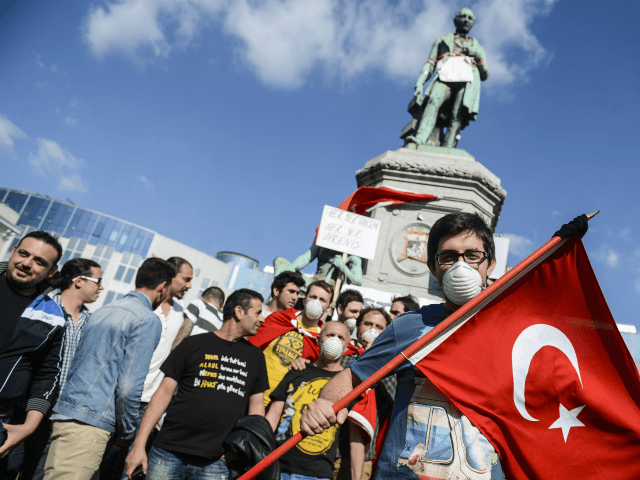The massive rise in the proportion of Muslim migrants in the country has resulted in two-thirds of Belgians feeling their nation is being “increasingly invaded”, according to a new study.
This sentiment was especially marked among respondents to the detailed survey aged 65 and over, 84 per cent of whom likened the influx of migrants and refugees to an invasion.
Overall, two-thirds of the 4,734 people polled believe there are “too many immigrants in Belgium”, while 77 per cent agreed with the statement, “Today we no longer feel at home as we did before [mass migration]”.
Entitled Black Yellow Blues 2017, the research was an initiative of public broadcaster RTBF and liberal newspaper Le Soir, carried out by sociology research institute Survey and Action and the globalist ‘This is Not a Crisis’ foundation.
Reporting on the study, which looked at the attitudes of French-speaking Belgians and how they have changed since a similar survey was taken in 1997, RTBF laments that it depicts a population which is growing “increasingly xenophobic”.
“The results raise many questions, but they revealed a society that is filled with fear and the rejection of otherness,” writes the taxpayer-funded broadcaster.
Produced by This is Not a Crisis, an organisation which seeks to tackle populism at a time it says societies in the West must undergo “permanent transformations”, the report claims researchers “observed the development of a true anti-Muslim paranoia [among Belgians], which has taken on a pathological dimension”.
According to 74 per cent of people surveyed, Islam is “not a tolerant religion”, while 60 per cent said the presence of so many Muslims in their nation presents a threat to its identity. Just 12 per cent said they believe the religion is “a source of enrichment” for Belgium.
On its website, the foundation states that its mission is to replace a Europe in which people are “nationalist, tribal, xenophobic, withdrawn, closed [and] nostalgic of borders” with one that is “cosmopolitan, universalist, inclusive, open, with a strong legitimate citizenship and appreciation for diversity”.
“There have been attacks against the Jewish Museum in Brussels, Charlie Hebdo, Bataclan and terraces of Paris, 22 March [terror attacks] in Brussels, the failed attempt in the Thalys, Nice in July,” the report states, acknowledging just a portion of the bloodshed inflicted on Europe by Islamic extremists in recent years.
However, these events are brought up in the context that This is Not a Crisis was pleased that “anti-Muslim paranoia … has not worsened following the attacks”.
RTBF was similarly disapproving of scepticism towards Islam, decrying Belgians for holding “the Muslim as a scapegoat”.
It argued that the “identity crisis Europe is facing” has left natives feeling “confused” and “[seeking] simple explanations like ‘there are too many immigrants’” to what it says are “complex problems”.
“Seven out of 10 Belgians think that immigrants want to impose their way of life,” the article notes disapprovingly, nowhere mentioning any of the attitudes disclosed by the 400 Muslims surveyed in the study.
These included 33 per cent of Muslim respondents revealing they “don’t like Western culture”, 29 per cent asserting they believe the laws of Islam to be superior to Belgian law, and 34 per cent admitting they “would definitely prefer a political system inspired by the Quran”.
With regards to the question of openness towards the other, the research found that 59 per cent of Muslims in Belgium would “condemn” the marriage if their son chose a non-Muslim partner, with the figure standing at 54 per cent for a daughter.

COMMENTS
Please let us know if you're having issues with commenting.